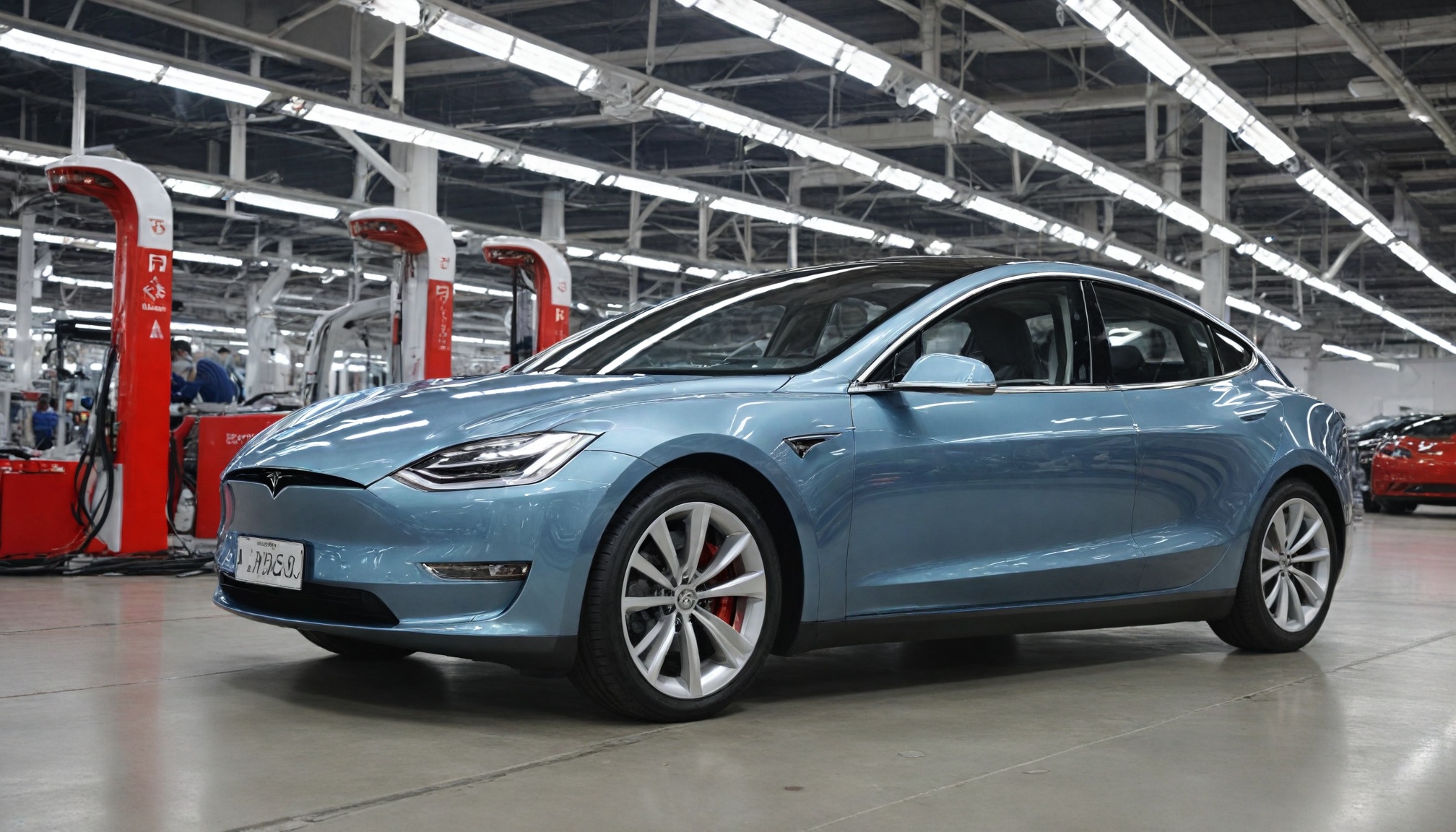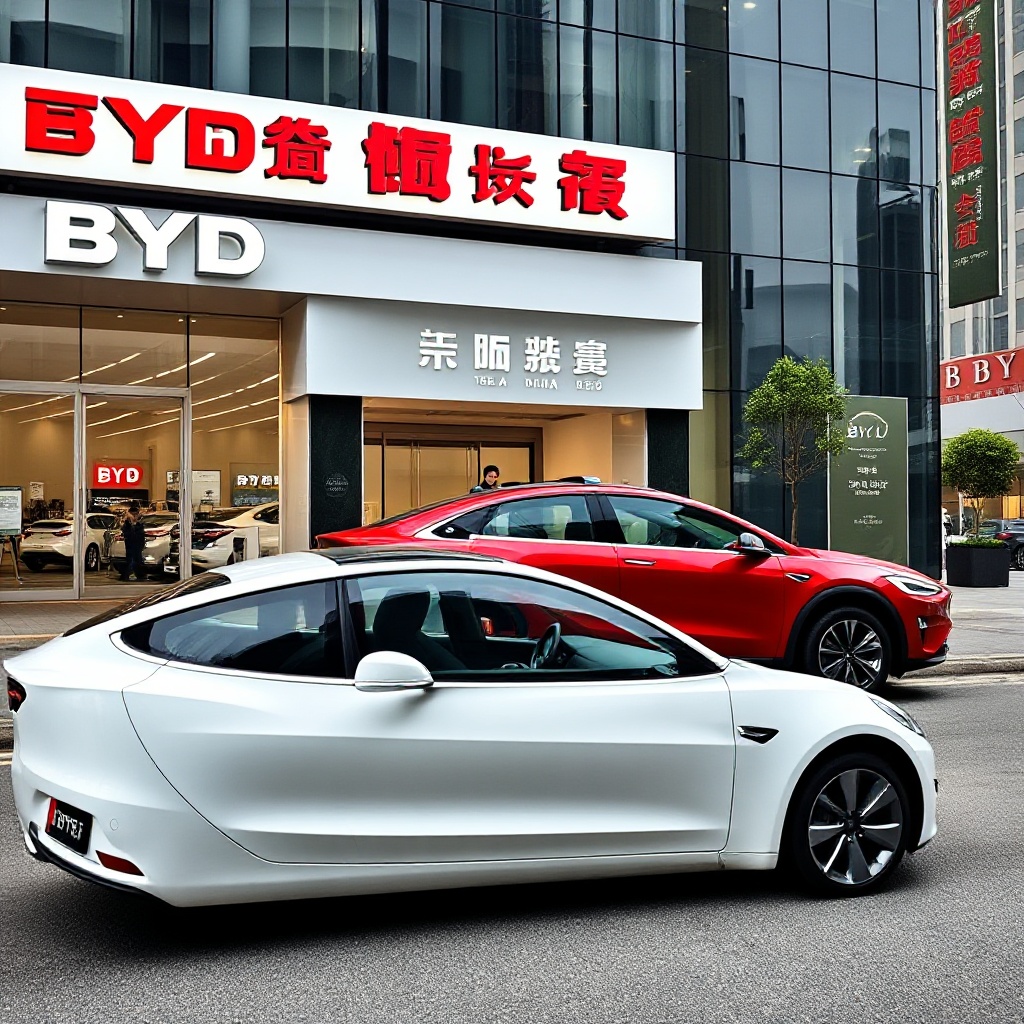
Tesla faces declining sales in China as local EV makers surge, with BYD now the global leader. Chinese manufacturers leverage innovation, pricing, and government support to outpace foreign competition.

Drivetech Partners
Tesla's once-dominant position in China's electric vehicle market continues to erode as the company reports its fourth consecutive month of sales decline while domestic manufacturers surge ahead. The American EV giant's struggles in the world's largest electric vehicle market highlight the dramatic shift in competitive dynamics as Chinese automakers leverage aggressive pricing, rapid innovation, and government support to capture increasing market share.
Key Takeaways
Tesla's April 2025 China sales dropped 26% from March and 6% year-over-year, marking four straight months of decline
BYD has overtaken Tesla globally, selling 4.27 million vehicles in 2024 compared to Tesla's 1.79 million
Chinese manufacturers benefit from government support programs that often exclude foreign companies
Over 100 new EV models are debuting at Chinese auto shows in 2025, intensifying competition against Tesla
Tesla must consider localizing more features and accelerating product refreshes to regain market position
Tesla's Deepening Sales Slump in China
The numbers paint a concerning picture for Tesla in China. In April 2025, the company sold 58,459 China-made vehicles, representing a 6% year-on-year decrease and a steeper 26% drop from March 2025. This marks the fourth consecutive month of declining sales in Tesla's second-largest market. For the January-April 2025 period, Tesla's deliveries in China fell a significant 18.31% compared to the same period in 2024.
The Shanghai Gigafactory's performance has hit a troubling low point, with first-quarter deliveries plummeting 22% year-on-year to just 172,754 units - the lowest in three years. Once a market leader, Tesla now ranks only fourth in China's passenger EV market despite the country's strong overall auto demand.

Chinese Automakers Surge to Dominance
As Tesla struggles, Chinese automakers are thriving. BYD achieved record sales of 372,615 passenger vehicles in April 2025, representing a 19.4% year-on-year increase. This remarkable performance has helped BYD secure approximately 32% of China's new energy vehicle (NEV) market, dwarfing Tesla's diminishing 6.1% share.
The shift in market leadership extends beyond China's borders. BYD overtook Tesla as the world's largest EV seller in 2024, delivering 4.27 million vehicles compared to Tesla's 1.79 million. This global realignment signals a fundamental shift in the electric vehicle landscape.
The success isn't limited to BYD alone. Geely and other major Chinese brands are posting robust growth, further intensifying competition for foreign automakers. Chinese manufacturers are capturing increasingly larger portions of both the battery electric and plug-in hybrid markets, squeezing out international competitors like Tesla.
Innovation and Pricing Drive Chinese EV Success
What's fueling the rise of Chinese EV manufacturers? A combination of rapid innovation and aggressive pricing. Over 100 new EV models are debuting at major Chinese auto shows in 2025, including numerous direct Tesla Model Y competitors like Xpeng G6 and Zeekr E6.
Chinese EV companies are leveraging bold pricing strategies while delivering frequent model rollouts and advanced technology features. Faster charging capabilities and superior in-car entertainment systems are particularly appealing to tech-focused Chinese consumers.
The ongoing "price war" in China's EV market is squeezing profit margins and challenging Tesla's ability to compete on both price and features. Advanced battery manufacturing, strong domestic supply chains, and government subsidies enable Chinese brands to undercut foreign rivals by up to 20%, creating a significant competitive advantage.
Government Policies Favor Domestic Manufacturers
The Chinese government's role in shaping the EV market can't be understated. Active support for NEV adoption through trade-in programs and policy support primarily benefits domestic players. Foreign brands, including Tesla, face regulatory hurdles and are often excluded from certain subsidies tied to domestic production requirements.
Electrified vehicles now account for over half of all new-car sales in China, representing the highest EV market share globally. Government initiatives are helping to accelerate the transition to electric mobility while strengthening domestic manufacturers' positions.
Local production advantages and policy support create significant headwinds for foreign competitors like Tesla. Despite operating its Shanghai Gigafactory, Tesla doesn't enjoy the same level of government backing as fully domestic manufacturers.
Tesla's Strategic Missteps in China
Tesla's difficulties in China can be traced to several strategic missteps. The company's "made in China" marketing message is struggling to resonate as domestic brands offer more localized design and features at lower prices. The company's slower model refresh rate and limited new product launches put it at a disadvantage versus Chinese rivals who debut multiple models annually.
Tesla's brand perception has been affected by public protests, regulatory scrutiny, and reduced participation in major Chinese auto shows since 2021. The company's position has deteriorated from market leader to fourth place in just a few years.
Perhaps most critically, Tesla's pricing strategy and limited model range are increasingly out of step with Chinese consumer preferences. While the company continues to focus on its core models, Chinese consumers are responding to the diverse offerings and competitive pricing from domestic manufacturers.
Global Implications of China's EV Leadership
China's EV industry growth is supported by a vertically integrated supply chain, advanced battery technology, and innovative business models. Chinese brands are rapidly expanding into global markets, with exports rising sharply as companies like BYD launch their own vehicle carriers.
The competitive intensity in the Chinese market is shaping the global evolution of the EV industry. China's battery technology leadership and manufacturing scale provide significant advantages in the global marketplace.
Traditional automotive powers like Europe and the US are struggling to keep pace with China's EV innovation and production capabilities. The balance of power in the global automotive industry is shifting eastward, with profound implications for established players.
Can Tesla Regain Momentum in China?
For Tesla to remain competitive, it must consider localizing more features, accelerating product refreshes, and revisiting pricing strategies. The company's upcoming affordable model could potentially help regain market share if tailored to Chinese consumer preferences.
Tesla's Full Self-Driving technology remains a potential competitive advantage if regulatory approval accelerates in China. Without significant strategic adjustments, Tesla risks further market share erosion as Chinese competitors continue to advance.
The company's global reputation and technological capabilities remain strengths that could be leveraged for a potential comeback. However, the window for regaining leadership is narrowing as Chinese manufacturers continue to innovate and expand their market presence.
The Automotive Industry's Changing Landscape
China has rapidly evolved from an automotive industry follower to a global EV leader in under a decade. Lower labor costs, government support, and massive domestic market scale have accelerated EV development and adoption.
Chinese automakers are now exporting their expertise and products globally, reversing historical automotive trade flows. The ongoing transition represents a fundamental shift in global automotive industry power dynamics.
Traditional automotive powers face increasing pressure as Chinese innovations drive the future of electric mobility. The developments in China's EV market not only challenge Tesla but signal a broader transformation of the entire automotive industry that will reshape transportation globally for decades to come.
Sources
Electrek: Tesla (TSLA) deliveries slide in China as it emphazies that its EVs are 'made in China'
CarNewsChina: China EV registrations in week 18: Nio 3,500, Xpeng 5,500, Tesla 7,300, BYD 59,310
Economic Times: China's BYD overtakes Tesla as the world's top EV seller
CnEVPost: Tesla China sells 58,459 cars in Apr 2025, down 6% year-on-year
Economic Times: Get ready for a showdown: Chinese EVs set to challenge Tesla's dominance
European Parliament: The future of European electric vehicles


